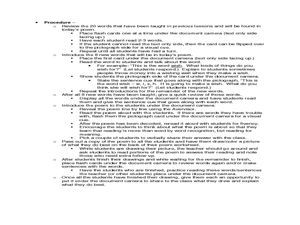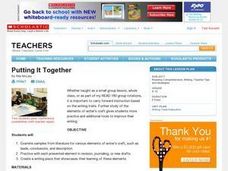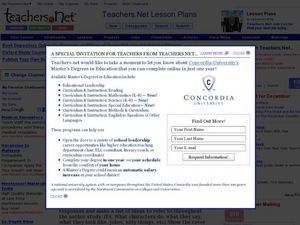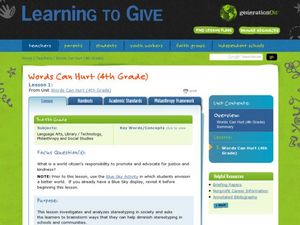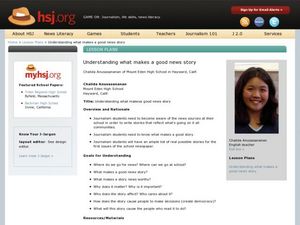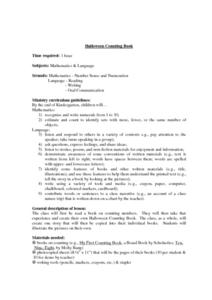Curated OER
Learning Sight Words with Picture Me Reading and the Document Camera
First graders identify sight words. In this learning sight words lesson, 1st graders view flash cards to practice the words and identify them in a poem.
Curated OER
Flow Charts
Students explore the use of flow charts and cyclical diagrams. They discuss how to read the charts. Students produce a simple flow chart or diagram to explain a process. They investigate various methods used to present text.
Curated OER
Classic Poetry
Fifth graders review the terms narrative and classic poetry. They are introduced to SMUGGLER'S SONG and compare the structure to recently read poetry. They join in on the refrain reading the story together as a class.
Curated OER
The Highwayman
Fifth graders re-read the story "The Highwayman" understanding the term "narrative verse". As a paired activity, they predict who or what might be the audience and provide feedback.
Curated OER
What About Health?
Students examine the concepts of healthy and unhealthy drugs. They read and discuss excerpts from the book "The Human Body," develop a list of healthy and unhealthy drugs, and write sentences relating to safety about medicines and other...
Curated OER
Now One Foot, Now the Other
Second graders, working as a whole class, with partners or small groups, use various Web sites to investigate the relationship between generations.
Curated OER
Panther in the Basement
Middle schoolers produce an ongoing journal in which they relate their personal response to literature. They examine the theme of the rights of the individual versus the whole. They explore conflict in Panther in the Basement.
Curated OER
Putting It Together in Writer's Workshop
This lesson about writing can be taught in small groups or large group settings. They examine basic writing techniques and practice using them to improve their writing.
Curated OER
Teaching Appositives
Explore appositives, phrases that immediately follow the noun they modify, using sentence strips, examples, and collaborative learning. The class works together to identify appositives and use commas to properly punctuate them. Partners...
Curated OER
Greed is Good?
From Mr. Merdle to Mr. Madoff? A viewing of the PBS adaptation of Charles Dickens’ “Little Dorrit” launches an examination of greedy characters in literature and a study of greed, unfairness, and economic hardship today. The richly...
Curated OER
Right to Remain Silent(?)
Learners consider the rights of journalists regarding source confidentiality, then create presentations on the New York Times' use of sources. They write guidelines to aid journalists in evaluating the trustworthiness of their sources.
Curated OER
Goals and Perseverance
Define the word perseverance to have learners understand why it is important in reaching goals. Young scholars research how Martin Luther King needed perseverance to accomplish his goals. They write acrostic poems using the word...
Curated OER
Character Scrapbook Teacher's Guide
Students analyze a book's characters and create a scrapbook to print and save. In this on line interactive characterization lesson plan, students identify character traits and gain a deeper understanding of a book's characters.
Curated OER
Beginning Persuasive Writing
Learners identify elements of persuasive writing. Students discuss writing strategies and topics. They participate in pair and share activities. Learners write a persuasive letter.
Curated OER
Introduction to Ludwig van Beethoven
"Ode to la Tortilla" and "Ode to Joy"? Sure! Use Gary Soto's poem to introduce learners to the ode format. After examining the descriptive words Soto uses, class members study a poster of Ludwig van Beethoven, suggest words that describe...
Curated OER
Robert Munsch: Author Study
Young scholars study Robert Munsch's style of writing. In this literature lesson, students read many of Robert Munsch's books, write a list of the characteristics found in his books, and write or orally tell a...
Curated OER
Teddy Bear, Teddy Bear
Students identify and use patterns in oral and written language, as well as in sounds, physical movements, and concrete objects.
Curated OER
Words Can Hurt: King Day
Students explore stereotyping. In this moral and character development lesson plan, students share reactions to a T-chart displaying what boys can do and girls can not do. Martin Luther King's accomplishments are discussed, and...
Curated OER
Understanding What Makes a Good News Story
Students explore the news sources at their school in order to write stories that reflect what's going on in all communities and to identify what makes a good story. In this news writing lesson, students journal about what makes a...
Curated OER
Halloween Counting Book
First graders recognize and write numerals from 1 to 10. They estimate and count to identify sets with more, fewer, or the same number of objects, listen and respond to others in a variety of contexts, and take turns speaking in a...
Curated OER
Family Quilts Keep us Warm
Students explore families and culture. In this family and culture lesson, students discuss their families and their similarities and differences. Students read the book The Keeping Quilt by Patricia Polacco and create their own quilt...
NPR
Lesson Plan: Trolls—Just Like You and Me?
Not all trolls hide under bridges; some of them hide behind computer screens! Learners explore the causes and effects of people leaving mean comments online. After learning vocabulary, watching and discussing a video, and responding to...
Curated OER
We Hope This Helps
Young scholars create writings and drawings to share with a children's hospital. They reflect on the project and how they have changed as a person. They also discuss how the community benefited as a whole.
Curated OER
Long Vowel Phoneme -ee- 1 of 4
Students apply word-level skills through shared and guided reading. They use poems of parts of poems as models for own writing. They read texts aloud with pace and expression.
